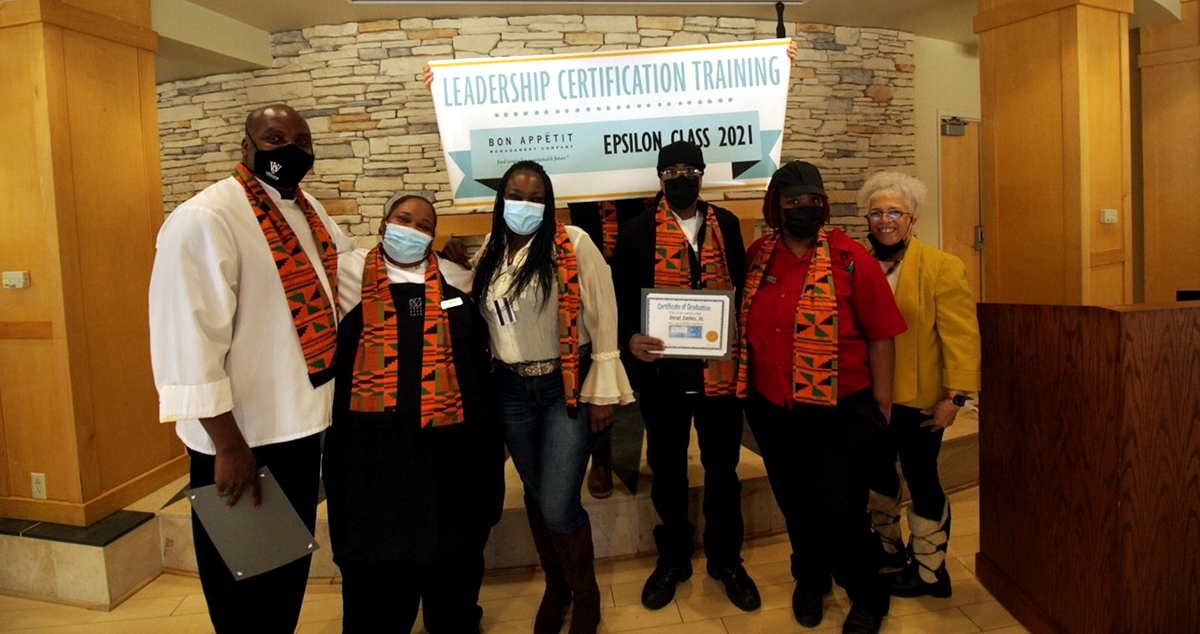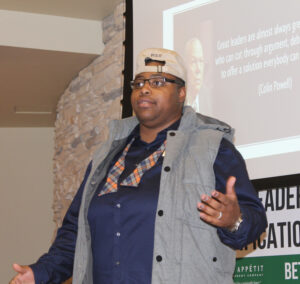Establishing Strong Leadership Roots to Grow Equity at Bon Appétit

On Friday, February 18, 2022, the Epsilon Class of the Bon Appetit Leadership Certification Training Program graduated five new certified leaders. They are (from left to right) Shantee Isaac, Sr., Janitha Redd, Marjorie Macklin, Daryl Carter, Sr., and Sharon Chissem. Pictured at the far right is Denise Massey, program facilitator. In celebration of this achievement and to commemorate 2022 Black History Month, the graduates were gifted kente print sashes with colors symbolizing growth, renewal and hope, status, and high worth. These employees join more than 70 others who have successfully completed the three-month development program preparing them to be highly effective Bon Appétit leaders.
While the food service industry is renowned for its diverse workforce overall, this balance often shifts significantly when it comes to leadership roles. Bon Appétit Management Company has long recognized that development of talent through training and mentorship programs is the key to building equitable opportunities. Mentorship and helping hourly employees develop new skills to grow their careers has always been a priority for Bon Appétit managers, but in 2022 Bon Appétit Management Company launched a companywide leadership certification program designed to give hourly employees a specific blend of hard and soft skill sets that will help them transition into management roles. The 13-module training program is modeled on a successful program created by Denise Massey, a human resources professional and educator who immediately recognized a problem when she attended her first all-staff meeting after joining Bon Appétit at a large midwestern university in 2016.
“I’m sitting off to the side and they’re getting ready to introduce me to the team and I’m looking at the group of employees and it looks diverse enough,” says Denise. “But then they started introducing the supervisors and the managers. Person after person was a white male. The management team was not representative of the employee base at all. And I’m looking at the audience of all these employees, and I’m thinking surely they’ve got some talent here that can be developed to move into some of these leadership roles.”
She started talking to the executive team. Rather than promoting from within, many of them felt forced to go outside to fill open supervisory roles because the existing hourly employees didn’t have the experience or skill sets required for the open roles. Yet, there were plenty of hourly employees who were hungry for opportunities. If Denise could get these employees the foundational leadership skills they needed in a streamlined way, she could help hourly employees move to management roles and build sustainable career paths.
“I did an informal needs assessment and that’s how I came up with the 13 modules. We talk about communicating and coaching…we do diversity and inclusion training and cover HR basics including equal employment opportunity laws. It’s basic, foundational stuff, but it’s important” she says.
In 2017, she launched the first leadership certification program at the university she served. While the leadership balance at her particular university wasn’t representative of leadership for all Bon Appétit teams, word of the program got around and managers quickly nominated participants from other nearby Bon Appétit accounts in the area. To date, more than 70 employees in the Midwestern region have graduated from the program and many have received promotions.
“What Denise achieved with the leadership certification program is remarkable,” says Liz Baldwin, Bon Appétit’s Chief Administrative Officer. “While Bon Appétit has always prioritized building long-term career pathways for employees through training, she recognized a need to empower people with a specific set of leadership skills that will open new doorways and last throughout their careers. And it’s built stronger teams overall. When I heard what she’d achieved with the program, I knew that Bon Appétit as a company needed to learn from her.”
The first companywide leadership certification cohorts began in early 2022 and more than 50 people are either actively in the program or have recently completed it, with interest growing daily.

LC Coleman-Robinson was the valedictorian at the first Leadership Certification graduation. They have addressed each graduating group since 2017 with inspirational messages. LC speaks about the challenges of becoming a leader and encourages the graduates to continue to use the training as a springboard to bigger and better roles. LC is now a Chef Manager.
Denise’s personal goal is to have 100 employees enroll in the program this year.
As a former educator, Denise loves teaching the course in person but realized that creating an eLearning track would make the opportunity more accessible to a larger group. Participants can now choose an e-learning format of 12 weeks of instructor-led online classes or a blended format that includes six instructor-led e-learning modules plus six live class sessions. Classes take approximately one to two hours each week, plus time for homework assignments and a final exam. Employees are paid for the class sessions and project time.
Regardless of track, each participant is paired with a mentor to offer them support and feedback throughout the program. “Mentors are important because they ensure that participants are putting the learning into practice,” says Denise. “It’s one thing to sit down and listen to me lecture or participate in an activity. It’s another thing to work with a mentor who says, ‘Here’s how you apply the class that you took on coaching, let’s practice and I’ll give you a critique.’”
When employees complete the program, there’s a formal graduation ceremony. Frequently, speeches are made by the clients of the accounts the employees serve and Bon Appétit leaders. Employees receive a certificate and a pin that says Certified Leader that they can wear to work. “We want to certify graduates as leaders to make this impactful to them and show everyone that it means something,” says Denise. While a promotion isn’t guaranteed, Denise’s goal is to have employees promoted soon after or even during the program. And there’s evidence of success. At the university she began at in 2016, the leadership balance has shifted to better reflect the diversity of the workforce. And she has high hopes for the impact of the program companywide.
“This program marries the things that I’m most passionate about: diversity, equity and inclusion and teaching and training. When I can combine these and impact lives, that is so rewarding for me,” she says.